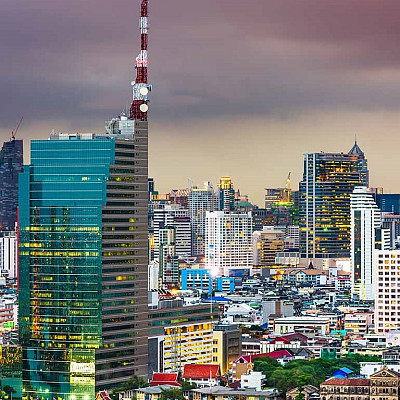How to Make Money on Real Estate Investment in Thailand
Making money through real estate investment in Thailand is not limited to Thai citizens; foreigners can also benefit. Compared to other investment options, purchasing a Thai apartment or house for resale or rental carries minimal risks. As Thailand is a popular holiday destination, there is always a high demand for both buying and renting real estate.

CONTENT:
- Market Prospects in Thailand
- How to Make Money from Real Estate in Thailand
- Prospects of the Rental Business in Thailand
- Best Cities in Thailand for Investment
- Real Estate Market in Thailand
- Real Estate Prices in Thailand
- Short-Term Rental
- Long-Term Rental
- How to Choose a Prospective Property in Thailand
MARKET PROSPECTS IN THAILAND To determine whether investing in Thai real estate can be profitable, let's examine the market prospects. Following the lifting of pandemic restrictions in 2021, Thailand saw a significant rebound in tourist arrivals, boosting the local economy.
In 2023, Thailand ranked 2nd in total GDP and 4th in nominal GDP per capita within the ASEAN region. According to the National Bank's forecast, the country's GDP is expected to grow by 3.8% in 2024, with inflation projected at 2.4%.
The economy's growth is driven by several factors:
- Increased local consumption
- Recovery of tourism
- Growth in private and public investment
One indicator of economic stability is the minimal fluctuation in the Thai baht's exchange rate over the past 10 years. As of November 2023, 1 USD was equivalent to 35.5 Thai baht. In 2013, the exchange rate hovered between 32 and 33 baht per dollar. Inflation, too, has rarely exceeded 3%.
Exports remain a key contributor to Thailand's GDP, but tourism also plays a major role, accounting for 20% of total GDP. Most tourists come from Europe and China, and Chinese nationals make up the largest group of foreign real estate buyers.
Real Estate Market in Thailand
The cost of housing in Thailand rises by 4–5% annually, with the most significant price increases in tourist regions. Phuket stands out as the top choice for both travelers and expatriates. Low-rise condominiums are being developed on the island and are highly sought after by tourists.
Foreigners can purchase real estate in Thailand, but there are certain restrictions. Condominiums can be bought with full ownership (freehold), while other types of properties, such as land, are only available through long-term leasehold agreements. The standard leasehold period is 30 years, with the possibility of two 30-year extensions. It’s important to note that freehold apartments are typically priced 10–15% higher than equivalent leasehold properties.
Mortgages are available in Thailand not only for citizens but also for foreigners. However, many foreign buyers prefer interest-free installment plans offered by developers during the construction phase. Some major developers in Phuket even offer a payback scheme, where buyers make payments during the construction phase and earn 5% annual interest on their investment. This allows investors to buy property at a discounted price during the initial sales phase and generate income before the condominium is fully operational.
Real Estate Prices in Thailand
Real estate prices in Thailand vary significantly depending on the region. Properties on the west coast of Phuket, central Bangkok, and upscale complexes in Pattaya tend to be more expensive. Meanwhile, properties in condominium complexes located further from the beaches or in less touristy areas are more affordable. Several factors influence property prices, including:
- Year of construction
- Availability of additional amenities in the complex
- Type of layout
- Window views
- Quality of interior finishes
In Phuket, the starting price for a studio or small one-bedroom apartment is typically around $110,000. Villas and townhouses are priced higher, starting at $300,000 for a small house. Premium apartments on the island begin at $330,000.
Property maintenance costs in Thailand are relatively low. Monthly utility costs (water and electricity) average around $59. Residential complexes with amenities like pools and gyms may charge additional maintenance fees.
Short-Term Rental
Short-term property rentals in Thailand offer a way to maximize income, with returns of up to 10% annually in resort areas.
Investors can purchase apartments and studios in modern condominium complexes managed by hotel brands. In this case, the buyer signs a contract with a management company that handles all rental procedures, including marketing, client sourcing, apartment preparation, maintenance, and cleaning.
There are various profit-sharing models between investors and management companies. In new or less-known properties, fixed income options are more advantageous, typically offering returns of 5–7% annually in Phuket.
Once a hotel complex has established a stable guest flow and increased unit profitability, management companies may propose more flexible profit-sharing arrangements. For instance, the total income may be divided between unit owners and the management company.
Long-Term Rental
Long-term rentals in Thailand generate lower returns compared to short-term rentals. However, they provide more stability as investors are less dependent on fluctuations between high and low tourist seasons. In Phuket, some areas further from the beaches and tourist spots are ideal for long-term rental properties, targeting expatriates and seasonal residents.
Despite lower returns, long-term rentals offer steady income throughout the year. Properties in less touristy areas can be more affordable, with entry prices starting at $70,000.
Investors can manage long-term rentals through real estate agencies, granting agents power of attorney to oversee rentals on their behalf.




